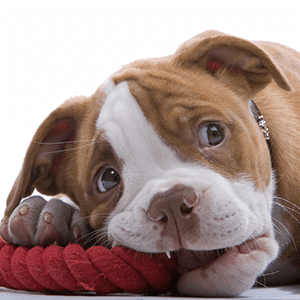Puppy Care Guide
A Guide to Caring for Your Puppy
If you recently acquired a puppy or you are planning on buying or adopting one, here is some useful information that may come in handy. Acquiring a puppy is a rewarding and fun experience. Puppies are cute and cuddly, but they do eventually grow up so make sure that you are thinking about the long term responsibility and commitment they require and not just being caught-up in the moment. Depending on the breed of puppy some may remain small and puppy-like while others grow to be quite large. Things that you will need to do at the puppy stage include the following:
Puppy Training and Behavior Curbing
We recommend that you begin training as soon as possible. You will first need to train them where to urinate or defecate. Some puppies pick this up quickly and others can take longer to get a grasp on housebreaking. The key is patience. To begin, start by taking your puppy out first thing in the morning especially after their morning meal. Most puppies will want to eliminate after a meal. If they do not go immediately, then you may need to give then some time. Try not to engage in play as it may distract the puppy and he or she will not focus on relieving themselves. If they still do not want to go, then return back into the house and place your puppy in a crate. The crate should have enough room for the puppy to turn around, stretch and stand up. If the crate is too large then the puppy may be able to allocate an area to potty and it will create difficulties housebreaking. After 5-10 minutes of confinement, take your puppy back outside and repeat until they finally eliminate. Make sure to praise your puppy when they do the correct behavior. Never punish or yell at your puppy as it can make him or her associate negative feelings around elimination time and make it much more difficult to potty train. To determine how long your puppy can wait in between elimination times, a good rule of thumb is to determine the age in months and add one (For example, a 2 month old puppy can hold their bladder for about 2-3 hours). Although not absolute, this can help determine when to take your puppy outside to eliminate. A consistent schedule will also keep your puppy on a routine. Remember that accidents will happen, but with time and patience most puppies can master housebreak training. Further training can range from basic obedience such as sit and stay to more sophisticated commands and tricks. You might want to consider attending a puppy training and obedience class. Also learning to socialize with other pets and other people are also important lessons your puppy should learn.
Feeding Your Puppy the Correct Diet
Puppies are very curious and an easily get in to trouble. Watch out for hazards such as: Toxins/Poisons - Buffo frogs, Sago Palm plants, snakes, spiders, and other poisonous plants; Household Hazards - exposed electrical wiring, hazardous chemicals, and small items that can cause a choking hazard as puppies tend to put everything in their mouths; and Outdoor Hazards - Watch out for aggressive dogs or other dangerous animals, do not leave your pet outside in a locked car without air conditioning running, and keep your pet either on a leash or in a carrier when traveling as moving vehicles can be deadly.
Playtime and Activities for Puppies
Puppies should get a lot of interaction and playtime. Many breeds, like Collies, need extra mental stimulation in the form of obstacles courses or mentally challenging toys. Positive attention helps with their development and form a bond with you and your puppy.
Immunization as Preventive Care
Immediately after birth, your puppy relies on the immunity protection (antibodies) passed on to them from their mothers. During the first weeks of their lives, they do not have the capabilities to produce their own immunity protection (antibodies) to fight off potentially deadly pathogens such as Rabies, Distemper/Parvo, and Bordatella, etc. The antibodies derived from their mothers are not sustainable and as such your puppy is in need of a series of vaccinations and boosters to help protect them from life threatening illnesses. This is why a visit to a veterinarian is so important. Immunization through vaccinations is needed to help prevent or reduce the likelihood of contracting any of these illnesses.
Parasite Screening & Treatment as Preventative Care
Parasite Screening & Treatment as Preventative Care - Another area of concern for your puppy is parasites. This includes anything from hookworms, roundworms, whipworms, coccidia, and heartworms. Most of these parasites are easily detected by doing a fecal test. Heartworm preventatives can be started in puppies as young as six weeks of age and will protect your puppy from heartworms and intestinal parasites.
What they need the most
Most importantly, don't forget to give your puppy love and care and they will return the favor as they are always happy to see you and to be with you. They are definitely a source of happiness. At Parkland Veterinary Hospital in Parkland FL, we take excellent care of your puppy. Ask about our Puppy Package (available with or without spay /neuter). We do your First Puppy Exam FREE, just call 954-757-1729.
